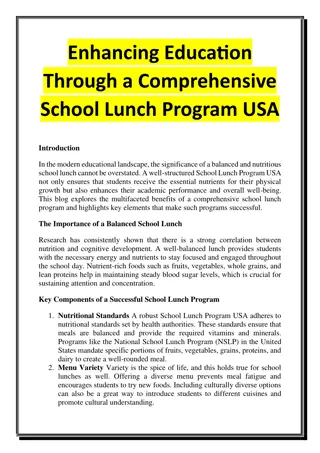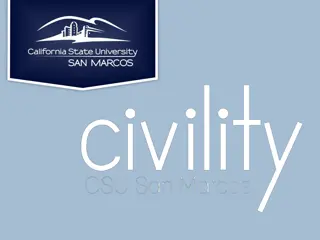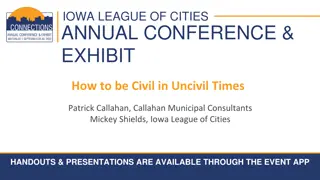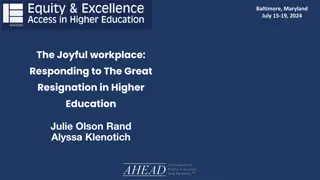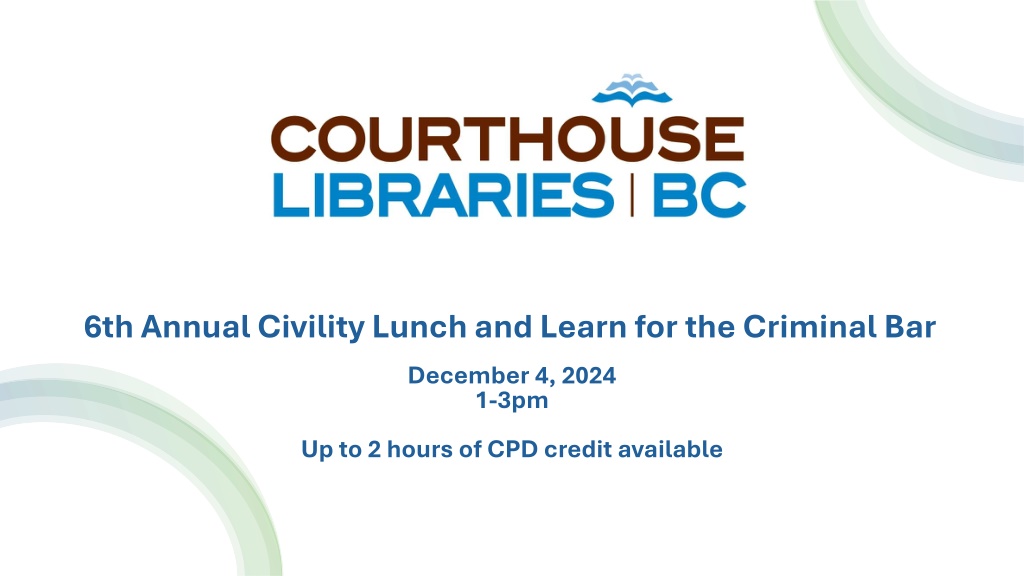
Importance of Civility in Legal Profession
Civility plays a crucial role in the legal profession, promoting respect, professionalism, and ethical conduct among lawyers. Learn about the significance of civility, its impact on the justice system, and how it contributes to a healthier work environment for legal professionals.
Download Presentation

Please find below an Image/Link to download the presentation.
The content on the website is provided AS IS for your information and personal use only. It may not be sold, licensed, or shared on other websites without obtaining consent from the author. If you encounter any issues during the download, it is possible that the publisher has removed the file from their server.
You are allowed to download the files provided on this website for personal or commercial use, subject to the condition that they are used lawfully. All files are the property of their respective owners.
The content on the website is provided AS IS for your information and personal use only. It may not be sold, licensed, or shared on other websites without obtaining consent from the author.
E N D
Presentation Transcript
6th Annual Civility Lunch and Learn for the Criminal Bar December 4, 2024 1-3pm Up to 2 hours of CPD credit available
Hosts: Gloria Ng, defence counsel and President of CDAS Andrea Spence, Professional Development Crown Counsel, BC Prosecution Service. Panelists: The Honourable Justice Baljinder Kaur Girn of the BC Supreme Court; The Honourable Judge David St. Pierre of the BC Provincial Court; Phil Riddell KC, defence counsel and Life Bencher for the Law Society of BC; Daniel Song KC, defence counsel; Kevin Westell, defence counsel and Bencher, Law Society of BC; Mike Wheeler, Crown Counsel, Public Prosecution Service of Canada; Nadia K. Farinelli, Deputy Director Legal Resources, Learning & Development, BC Prosecution Service; and Lisa Dumbrell, Crown Counsel, BC Prosecution Service.
What is civility and why is it important? Civility is a part of professionalism for lawyers. At its core, it is this notion of respect . respect for the system of justice and the players in the system. This is why civility is especially important for those of us who practice before the courts. What we must show our community is that we ourselves have enough confidence in the rule of law and the administration of justice to accord a place of respect to the competing view. Principles of Civility for Advocates, The Advocates Society Institute for Civility and Professionalism
Law Society of BC Code of Professional Conduct The Canons of Legal Ethics are included in Chapter 2 of the Law Society of BC Code of Professional Conduct. A version of the Canons has formed part of the Code of Professional Conduct since 1921. The Canons are a general guide to a lawyer s duties to the courts, clients and other lawyers. The Canons state: A lawyer is a minister of justice, an officer of the courts, a client s advocate and a member of an ancient, honourable and learned profession. In these several capacities, it is a lawyer s duty to promote the interests of the state, serve the cause of justice, maintain the authority and dignity of the courts, be faithful to clients, be candid and courteous in relations with other lawyers and demonstrate personal integrity. Rule 2.1-4 provides: A lawyer s conduct to other lawyers should be characterized by courtesy and good faith. Any ill feeling that may exist between clients or lawyers, particularly during litigation, should never be allowed to influence lawyers in their conduct and demeanor toward each other or the parties. Personal remarks and references between lawyers should be scrupulously avoided, as should quarrels between lawyers that can cause delay and promote unseemly wrangling. Rule 7.2-1 provides: A lawyer must be courteous and civil and act in good faith with all persons with whom the lawyer has dealings in the course of their practice.
Civility is also relevant to health and well-being. The role of a lawyer is often stressful and incivility can increase negative emotions and burnout. Lawyers can diffuse tensions and decrease hostility by practicing in a more civil manner. It may feel right in the heat of the moment to respond to a pushy client or an aggressive opposing counsel in a cutting manner, but in the long term this may do more harm than good. In such situations, lawyers should strive to apply the golden rule treat others as you want to be treated. Civility Best Practices, Law Society of Alberta (October 2024)
View from the Bench
5 Top Tips for Civility
1. Overreliance on emails don t be afraid to pick up the phone or interact in- person
2. Virtual Court is still Court
3(a) Maintain respect for witnesses and accused persons
3(b) Treat professional staff, courtroom staff and non- lawyers with respect and integrity
Law Society of BC v. Cherniack, 2022 LSBC 36 Law Society of BC v. Davison, 2022 LSBC 23 Law Society of BC v. Heflin, 2022 LSBC 41 Law Society of BC v. Johnston 2023 LSBC 16
4. Understanding Diversity and Speaking Up Against Unfair Treatment
Familiarize yourself with the challenges your colleagues face: But I was Wearing a Suit (Parts I and II) [Grassroots Project by Indigenous Lawyers] But I Look Like a Lawyer [Federation of Asian Canadian Lawyers BC]
Wheel of Privilege and Power
5. Maintain Civility in the Face of Incivility
Opposing counsel advises you in person, in email, or on the record that something you have said or done felt to them to be unprofessional or lacked civility. You don t think you have done anything of the sort how can you respond?
Civility Challenges from the Bench What are your options in the moment and later, if you think you are experiencing incivility from the Bench?
Opposing Counsel comes to you on the eve of trial to say they have a personal crisis and cannot attend the trial, they are seeking an adjournment. If opposing counsel is defence, what do you do as Crown? What position do you take, what do you say on the record, what do you say to counsel? If opposing counsel is Crown with a personal crisis, and as defence, your client really needs this trial to go ahead what do you do?
In a trial for sexual assault, you notice the complainant is starting to visibly become upset. The intrusiveness of the questions is debatable. As Crown what can you do? As defence what can you do? Does it matter if this occurs during direct or cross- examination?
Where is the line between zealous advocacy and incivility bordering on professional misconduct? As defence, what challenges do you sometimes face when a client has certain expectations of how you will conduct their case? As Crown, how do you avoid allegations of prosecutorial misconduct? As a judge, how does it affect your job when dealing with acrimonious interactions between counsel? The Supreme Court of Canada in Groia v Law Society of Upper Canada, 2018 SCC 27 identified the following examples of incivility: overly aggressive, sarcastic, or demeaning courtroom language ; constant allegations of impropriety ; disparaging personal attacks from lawyers ; and inappropriate vitriol, sarcasm and baseless allegations of impropriety .







